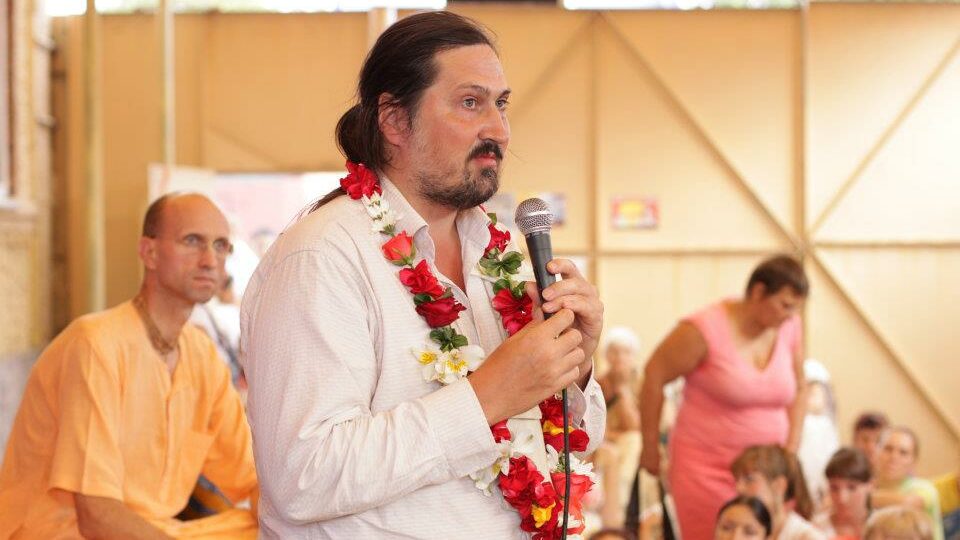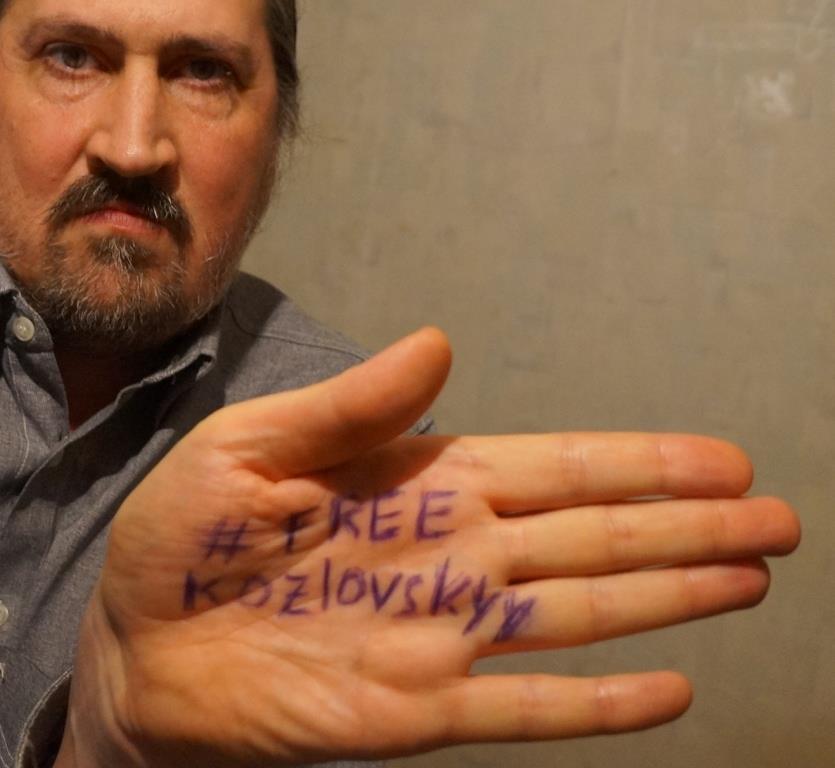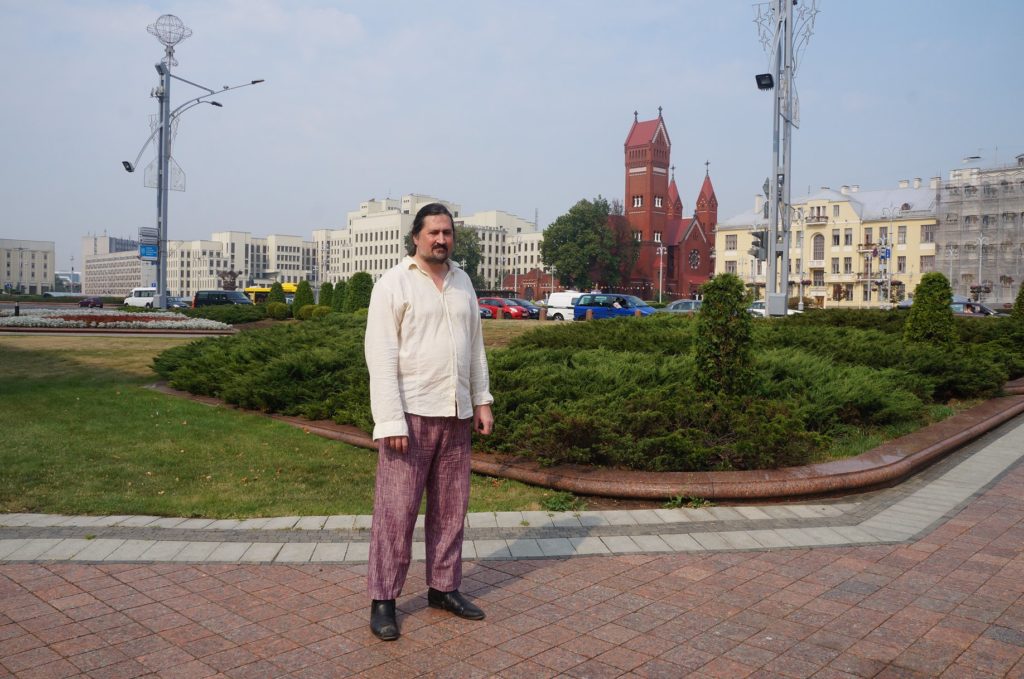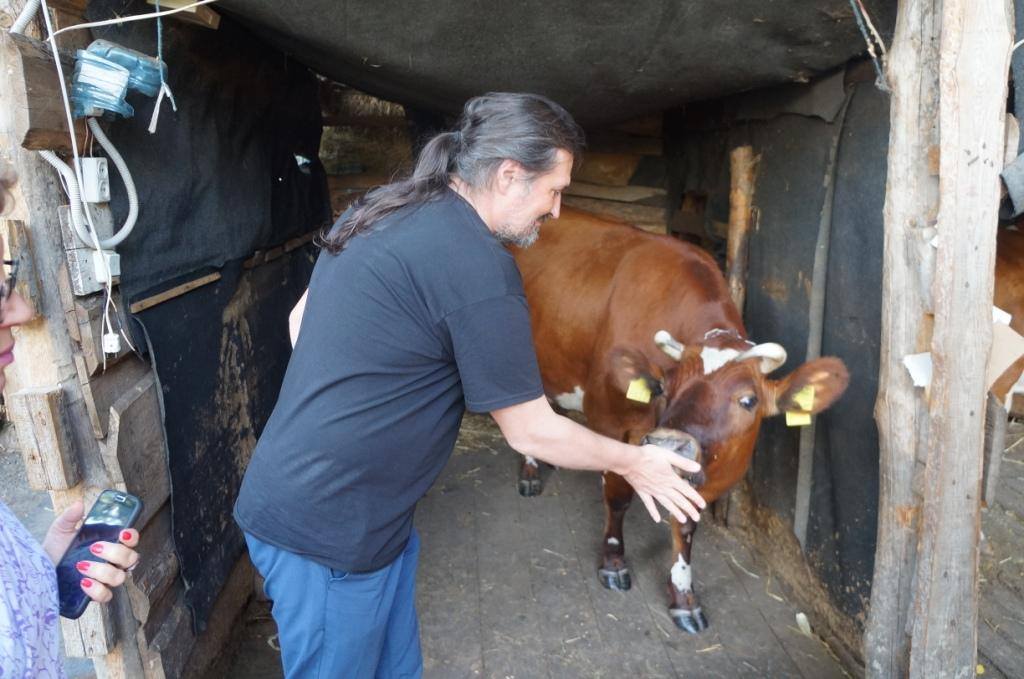17 August 2023.
Victoria Arnold, Forum 18
Musician and teacher Anna Chagina has been handed a fine and a ban on internet posting for opposing Russia’s invasion of Ukraine. She stood accused of "discrediting" the Russian armed forces more than once in a year. "I also want to remind you of a simple ethical rule – do to others as you would have them do to you," Chagina said in her final statement. Elsewhere, Mikhail Simonov, the first person to be sentenced to jail for opposing the war from a religious perspective, has lost his appeal against his 7-year jail term.
Judge Roman Zaynulin imposed the punishment “with the aim of restoring social justice and preventing [Chagina] from committing a new offence." He reduced the fine to 100,000 Roubles to account for time spent under restrictions. 100,000 Roubles is equivalent to almost 6 weeks’ average wages in Tomsk Region as of May 2023. It is unknown whether or not Chagina will choose to appeal. In the meantime, Chagina must abide by travel restrictions and a good behaviour order. According to the verdict, her laptop will be returned when the verdict comes into force, but her mobile phone will remain confiscated as it was “used in the commission of the offence." (see below).
On 14 August, Forum 18 wrote to Soviet District Court and Tomsk Regional Prosecutor’s Office, asking why a Biblical quotation (as in Chagina’s first, administrative prosecution) and reposts of Karpitsky’s observations on the war were considered "discreditation" of the Russian armed forces, and whether the prosecution intended to challenge the court’s verdict. No response has been received (see below).
In court, Chagina did not deny making the internet posts which led to her conviction but pleaded not guilty, stating that she had always held pacifist views: "There is the right, enshrined in law, to express any opinion publicly. ‘No to war’ is [my] position, regardless of which war" (see below).
“I also want to remind you of a simple ethical rule – do to others as you would have them do to you," Chagina told the court in her final statement. "I believe that we will be able to overcome this deepest crisis that has arisen between our peoples, and I urge everyone to find strength in ourselves and stop hating. Don't believe what they say. We have no greater enemies than ourselves" (see below).
"When military action finally comes to an end and those who survive return – and sooner or later, that will happen – the [Russian Orthodox Church] will have to answer for its ideological support of the war," Chagina told Forum 18 through friends on 11 August, before the verdict came into legal force. "I think a global crisis of faith awaits us inside the ROC [Russian Orthodox Church]" (see below).
Mikhail Simonov, the first person to be sentenced to imprisonment for opposing the war in Ukraine from a religious perspective, appealed unsuccessfully against his conviction on 25 July 2023 at Moscow City Court (see below).
On 30 March, Forum 18 asked the Federal Investigative Committee and its Moscow branch, as well as Moscow City Prosecutor's Office, in what way Simonov's comments could be construed as motivated by hatred of a political or social group, and why it was necessary to have a 63-year-old man with health problems placed in detention. Forum 18 has received no reply to any of these questions (see below).
On 30 March, Simonov had received a 7-year prison term under Criminal Code Article 207.3 ("Public dissemination, under the guise of credible statements, of knowingly false information on the use of the Armed Forces of the Russian Federation") for making online comments condemning the war, including one which said "We, Russia, have become godless. Forgive us, Lord!" He is currently in transit within the prison system and it remains unknown where he will serve his sentence (see below).
Ongoing and new cases
In August 2022, Darya Lebedeva, head of the joint court system press service for St Petersburg, insisted to Forum 18 that Fr Ioann had to be held in detention because: "if at liberty and not isolated from society, Kurmoyarov may continue his criminal activity, conceal himself from investigators and the court, destroy evidence and otherwise interfere with the criminal proceedings".
Fr Ioann is on trial under Criminal Code Article 207.3 ("Public dissemination, under the guise of credible statements, of knowingly false information on the use of the Armed Forces of the Russian Federation") for posting anti-war videos on YouTube, and is next due to appear in court on 22 August 2023.
Federal Security Service (FSB) investigators in Kaluga also searched the home of Pentecostal bishop Albert Ratkin on 8 August, and took him in for questioning. He was later released and is so far being treated as a witness in Sipko’s case (see forthcoming F18News article).
Administrative Code cases for opposition to the war on grounds of faith or with the use of religious imagery and quotations continue to be brought. Cases in 2023 have included Eduard Charov, who was fined in April for "discrediting" the Armed Forces and "inciting hatred" towards state authorities after he criticised Russia's invasion of Ukraine on social media, asking "Would Jesus Christ have gone to kill in Ukraine?".
Conscientious objectors to military service have been jailed, such as Pentecostal Andrey Kapatsyna who refused to fight in Ukraine, telling commanders that "in accordance with his religious beliefs, he could not take up arms and use them against other people." On 29 June 2023, a Vladivostok court sentenced him to 2 years, 10 months' imprisonment under new legislation punishing non-fulfilment of orders in a period of combat operations. There is no legal or practical provision for alternative civilian service (ACS) during mobilisation, despite the Constitution guaranteeing this right for every citizen.
“Discreditation" and “False information"
Specific penalties for criticising Russia's actions in its renewed war against Ukraine came into force on 4 March 2022. These include Administrative Code Article 20.3.3 ("Public actions aimed at discrediting the use of the Armed Forces of the Russian Federation"), which is used against apparently any form of anti-war statement either in public spaces or online, and Criminal Code Article 207.3 ("Public dissemination, under the guise of credible statements, of knowingly false information on the use of the Armed Forces of the Russian Federation").If individuals commit an offence covered by Administrative Code Article 20.3.3 more than once within a year, they may be prosecuted under Criminal Code Article 280.3 ("Public actions aimed at discrediting the use of the Armed Forces of the Russian Federation in order to protect the interests of the Russian Federation and its citizens, [and] maintain international peace and security").
On 28 March 2023, a series of amendments to the Criminal Code came into legal force, increasing penalties for disseminating "false information" about and repeatedly "discrediting" the Russian Armed Forces (Criminal Code Articles 207.3 and 280.3). The amendments also widen the definition of these offences (and of Administrative Code Article 20.3.3) to include criticism of "volunteer formations, organisations and individuals who assist in the fulfilment of tasks assigned to the Armed Forces of the Russian Federation" (that is, private mercenary units).
Under Criminal Code Article 280.3 ("Public actions aimed at discrediting the use of the Armed Forces of the Russian Federation in order to protect the interests of the Russian Federation and its citizens, [and] maintain international peace and security"), Part 1, the maximum prison sentence was raised from 3 years to 5 years. Under Part 2, the same offence if resulting in "death by negligence", harm to health or property, or mass public disorder, the penalty was raised from 5 years to 7 years.
Under Criminal Code Article 207.3 ("Public dissemination, under the guise of credible statements, of knowingly false information on the use of the Armed Forces of the Russian Federation"), Part 1, the maximum prison sentence was raised from 3 years to 5 years (Part 2 remains unchanged).
Russian Orthodox (ROCOR) priest Nikandr Pinchuk was the first person to receive a criminal conviction for opposing Russia's war in Ukraine on religious grounds. On 17 October 2022, a court in the Urals fined him two months' average local wage under Criminal Code Article 280.3, for a social media post condemning the "horde of the Antichrist" attacking Ukraine. Neither Verkhoturye District Court nor Prosecutor's Office replied to Forum 18's questions on why expressing religious views on the war in Ukraine should be considered "discreditation" of the Armed Forces and incur such a large fine.
Tomsk: Fine and ban on internet posts for “discrediting" the army
Judge Roman Zaynulin found her guilty and imposed a fine of 150,000 Roubles and a 2-year ban on making online publications. He reduced the fine to 100,000 Roubles to take into account the one day Chagina was detained after her arrest, and the time she spent under restrictions during the investigation and awaiting trial. 100,000 Roubles is equivalent to almost 6 weeks’ average wages in Tomsk Region as of May 2023.
In her final statement to the court, Chagina – a viola player and music teacher – said that she believed that war, “no matter what it is called – a special military operation, or something else – causes irreparable harm [and] damage to our countries and human destinies," the Vtomske.ru local news website reported on 7 August. “I believe that no one can win a war. Only love, which always remains, can win. Even now, when our soldiers are shooting at each other, when people are dying, it still remains."
“We have the opportunity to finish this as soon as possible. This is our responsibility. I want to remind those who consider themselves Christians that Kiev is the mother of Russian cities," Chagina added.
“I also want to remind you of a simple ethical rule – do to others as you would have them do to you. I believe that we will be able to overcome this deepest crisis that has arisen between our peoples, and I urge everyone to find strength in ourselves and stop hating. Don't believe what they say. We have no greater enemies than ourselves."
Prosecutors had sought a fine of 200,000 Roubles and a 3-year ban on posting material online. The maximum punishment Chagina could have received under Criminal Code Article 280.3 ("Public actions aimed at discrediting the use of the Armed Forces of the Russian Federation in order to protect the interests of the Russian Federation and its citizens, [and] maintain international peace and security"), Part 1, was 3 years’ imprisonment. This was because her alleged offence took place before the March 2023 increase in possible sentences.
The verdict has not yet entered legal force. Chagina has not yet decided whether to appeal, she told Forum 18 through friends on 11 August - she has 15 days to do so from the date the verdict was issued. Akt-Produkt, an independent St Petersburg-based record label with which Chagina has collaborated, noted on VKontakte on 13 August that supporters had already managed to raise enough money to pay the fine.
In the meantime, Chagina must abide by travel restrictions and a good behaviour order. According to the verdict, her laptop will be returned when the verdict comes into force, but her mobile phone will remain confiscated as it was “used in the commission of the offence."
First conviction
Criminal Code Article 280.3 punishes those who “discredit" the Russian armed forces more than once within a year. Chagina's first conviction for this was for displaying a poster reading “Blessed are the peacemakers (Matthew 5:9)" at an anti-war protest in Tomsk in March 2022, just two days after the new offence of “discreditation" came into force.“Many times after [the arrest for the poster], I inwardly turned to these words of Christ and realised that peacemaking begins with what is in a person's heart," Chagina told Forum 18 through friends on 11 March 2023.
On 14 March 2022 she was fined 45,000 Roubles under Administrative Code Article 20.3.3 ("Public actions aimed at discrediting the use of the Armed Forces of the Russian Federation"), Part 1, also at Soviet District Court in Tomsk.
Second accusation of “discreditation"
The second accusation of “discreditation," which led to Chagina’s criminal prosecution, derived from a number of posts she made on her profile page on the VKontakte social network, which a witness allegedly came across by chance and reported to an acquaintance in the FSB. In summer 2022, Chagina had begun to notice that she was being followed. After her arrest in autumn 2022, the investigator remarked that all the local police already knew her, media outlet Govorit Ne Moskva (which specialises in regional stories) noted in December 2022.Those internet posts cited in the August 2023 court verdict, seen by Forum 18, comprise a post on 12 May 2022 saying that she had signed human rights defender Lev Ponomaryov's change.org petition against Russia's renewed invasion of Ukraine, and another on 7 June 2022 saying “NO TO WAR" (with a link to a news report on the State Duma’s proposed creation of more war-related criminal offences), as well as three reposts of texts from the Facebook page of Nikolay Karpitsky.
Karpitsky is a religious philosopher from Tomsk who now lives in Slovyansk in Ukraine. He has documented the experience of wartime life almost every day since the invasion and produced a series of videos on YouTube entitled “War from the point of view of religion."
Karpitsky’s texts which feature in the court’s written verdict are those (of 3 May, 28 May, and 11 June 2022) which accuse Russian forces of targeting Ukrainian homes and civilian infrastructure. These include: “After all, they will not spare anyone. First, they will demolish everything they can with artillery. Then, on the cleared territory, the intelligence services will look for ‘Nazis’, that is, to torture and kill all those who are suspicious. And then the city will be given to the gopniks [thugs, delinquents] for plunder, who will kill just for the sake of entertainment. Thus they have already acted in Bucha and other cities."
The Investigative Committee and experts for the prosecution determined that these posts characterised Russian troops’ actions as “predatory, dangerous, [and] violent."
A number of other materials from Chagina’s VKontakte page contributed to the Investigative Committee’s 30 November 2022 decision to charge her (seen by Forum 18), though do not appear in the final indictment or verdict.
These included a 17 May 2022 repost from the “Libertarnaya Teologiya" VKontakte page, with information about and links to download a book entitled “The long road of Russian pacifism: the ideal of international and internal peace in the religious-philosophical and socio-political thought of Russia" (ed. T. Shchapov, Institute of World History, Russian Academy of Sciences, 1997). This included the quotation: “Saints who acquired inner peace, according to hagiographic literature, almost always became peacemakers in both the private and political life of ancient Rus' .. With their lives, they testified that only by renouncing selfish aspirations, life ‘according to the elements of this world’, affirming oneself in love for God and neighbour, can a person defeat evil – not to slay it with a sword, but to absorb it into oneself and dissolve it by the effort of faith and love."
In court, Chagina did not deny making the posts but pleaded not guilty, stating that she had always held pacifist views: “There is the right, enshrined in law, to express any opinion publicly. ‘No to war’ is [my] position, regardless of which war."
August 2023 verdict
Judge Zaynulin found no mitigating or exacerbating circumstances in the case, and “taking into account the effect of the chosen punishment on the correction of the guilty person" and “with the aim of restoring social justice and preventing [Chagina] from committing a new offence," decided to impose a fine and 2 years’ “deprivation of the right to carry out activities related to administration of sites on electronic and information-telecommunication networks, including the internet, and the posting of information on them for public access."Forum 18 wrote to Soviet District Court and Tomsk Regional Prosecutor’s Office on 14 August, asking why a Biblical quotation (as in Chagina’s first, administrative prosecution) and reposts of Karpitsky’s observations on the war were considered “discreditation" of the Russian armed forces, and whether the prosecution intended to challenge the court’s verdict. No response has been received.
“A global crisis of faith awaits us inside the Russian Orthodox Church"
“As far as my religious life is concerned, everything has remained the same: I go to church, nobody has tried to limit my freedom of belief in any way," Chagina told Forum 18 through friends on 11 August, before the verdict came into legal force.“When military action finally comes to an end and those who survive return – and sooner or later, that will happen – the [Russian Orthodox Church] will have to answer for its ideological support of the war. If Russia openly recognises its defeat, the Church will be emotionally responsible for this before society.
“There are already few people now in the churches, on weekdays there’s almost nobody at all. And after the war, I think a global crisis of faith awaits us inside the ROC [Russian Orthodox Church]. There are priests who are generally afraid to speak, and this fear is not just of the state, but also of the people. It is as if an abyss has grown between pastor and flock."
Moscow: 7-year prison sentence upheld
The Investigative Committee’s case against Simonov was based on two comments he made on the VKontakte social network in March 2022: "Killing children and women, on Channel One [television] we sing songs. We, Russia, have become godless [bezbozhniki]. Forgive us, Lord!"; and "Russian pilots are bombing children."
On 30 March 2023, the capital’s Timiryazevsky District Court found Simonov guilty under Criminal Code Article 207.3 ("Public dissemination, under the guise of credible statements, of knowingly false information on the use of the Armed Forces of the Russian Federation"), Part 2 Part D ("based on political, ideological, racial, national, or religious hatred or enmity, or based on hatred or enmity against any social group"). He was sentenced to 7 years’ imprisonment.
On 30 March, Forum 18 asked the Federal Investigative Committee and its Moscow branch, as well as Moscow City Prosecutor's Office, in what way Simonov's comments could be construed as motivated by hatred of a political or social group, and why it was necessary to have a 63-year-old man with health problems placed in detention. Forum 18 also asked Moscow City Prosecutor's Office why prosecutors had requested such a long prison sentence of 7 years. Forum 18 has received no reply to any of these questions.
Simonov is still in transit within the prison system, a person following the case told Forum 18, and as of early August, he was being held at Investigation Prison No. 2 in Tsivilsk in the Chuvash Republic. It is as yet unknown where he will serve his sentence.
Simonov remained in detention throughout the investigation and trial and between his conviction and appeal, and is therefore deemed to have already served 13 and a half months of his prison term. He is thus likely to be due for release in June 2029 – after which he will be subject to a 4-year ban on some online activities.
At Simonov’s appeal hearing, his lawyer Aleksandr Aldayev argued that Criminal Code Article 207.3 contravenes international law, RusNews reported on its Telegram channel on 25 July. Simonov himself stated that he “did not fully understand the essence of the charge against him," and that pleaded guilty only to the offence of “Public dissemination of knowingly false information under the guise of authentic information" (ie. Article 207.3 Part 1), denying that he had been motivated by “political hatred." The appeal judge refused, however, to reclassify the charge against him. (END)



